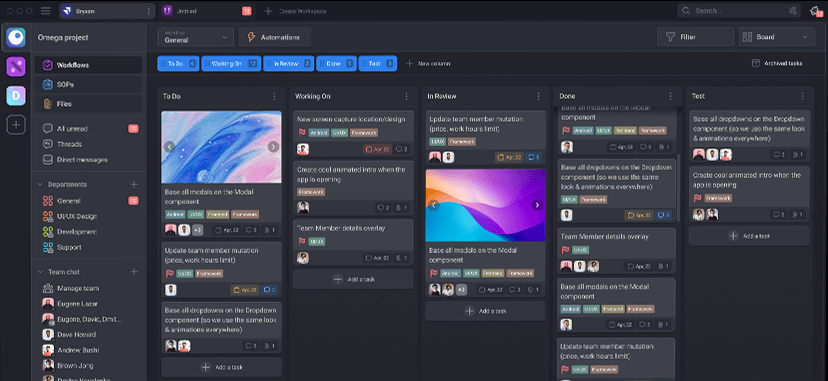
Click the button to start reading
Streamlining Your Social Media Efforts: A Guide to Effective Project Management
In an ever increasingly digital world, social media has emerged as a game-changer for businesses of all sizes. The meteoric rise of platforms like Facebook, Instagram, Twitter, LinkedIn, and TikTok has transformed the way businesses communicate, engage, and build relationships with their customers.
With millions of people worldwide actively participating in social media, it has become an indispensable tool for entrepreneurs, small to medium business owners, and social media professionals alike.
Social media offers businesses a unique opportunity to interact with their target audience, showcase their brand personality, and create a sense of community. This, in turn, leads to improved brand recognition, increased customer loyalty, and a boost in sales.
However, managing multiple social media platforms and campaigns takes time and no short amount of effort.
That’s where social media project management comes into play.
In this comprehensive guide, we will delve into the world of social media project management, exploring its meaning, the tools that can help you succeed, and how to develop a robust social media project management system.
Our goal is to provide you with valuable insights and actionable tips to effectively manage and streamline your social media efforts, ensuring that your business reaps the full benefits of this powerful marketing tool.
So, let’s dive in!

What is Project Management for Social Media
Project management for social media refers to the process of planning, organizing, executing, and monitoring social media activities and campaigns to achieve specific goals and objectives.
In the context of social media, project management encompasses a wide range of tasks, including content creation, scheduling, engagement, analytics, and reporting.
It involves coordinating various teams and resources, such as graphic designers, copywriters, social media managers, and analytics specialists, to ensure that all aspects of a social media campaign run smoothly and cohesively.
Social media project management is crucial for businesses because it:
- Enhances efficiency: By streamlining tasks and assigning clear roles and responsibilities, project management helps in reducing redundancies and ensuring that team members work efficiently towards common objectives.
- Boosts consistency: A well-managed social media project ensures that the brand’s message, tone, and visual identity are consistent across all platforms and campaigns, leading to a cohesive brand image and better customer recognition.
- Facilitates collaboration: Social media project management encourages teamwork and cooperation between team members, leading to better communication, faster problem-solving, and improved results.
- Enables scalability: As businesses grow and social media presence expands, project management systems allow for smooth scaling of operations without compromising on quality and efficiency.
- Provides better insights: A well-structured project management system offers valuable insights into the performance of social media campaigns, helping businesses identify areas of improvement and make data-driven decisions.
In short, effective social media project management is the backbone of a successful social media strategy. It allows businesses to stay organized, manage resources efficiently, and deliver high-quality content that resonates with their target audience.
By implementing a robust social media and project management system, businesses can not only achieve their marketing goals but also create a strong and lasting online presence that drives customer engagement, loyalty, and growth.

Different Types of Social Media and the Role of Project Management
Understanding the various types of social media platforms and their unique features is the most important part of creating a tailored project management plan. Each platform has its own quirks and special features, so marketing on them needs to be fine-tuned to perfection.
Here, we will explore some of the most popular platforms and provide a brief example of how project management can help maximize their potential.
With its extensive user base and diverse features, Facebook offers businesses numerous opportunities to connect with their target audience.
By implementing project management strategies, companies can optimize their Facebook presence and achieve their marketing goals more effectively.
- Content Calendar: Developing a well-planned content calendar is essential for maintaining a consistent posting schedule and engaging your audience. Project management tools can help in organizing and visualizing your content plan, including the types of posts (text, images, videos, or links), posting frequency, and ideal times for publishing.
- Task Assignment: Effective Facebook marketing requires collaboration between various team members, such as graphic designers, copywriters, and social media managers. Project management can streamline this process by assigning tasks and deadlines to each team member, ensuring that everyone is aware of their responsibilities and the overall project timeline.
- Monitoring Engagement Metrics: To optimize your Facebook marketing efforts, it’s crucial to track engagement metrics such as likes, comments, shares, and reach. Project management tools can help monitor these metrics, providing insights into the performance of individual posts and overall page performance.
- Event and Group Management: Facebook events and groups are excellent ways to foster community and encourage interaction with your audience. Project management can assist in organizing and promoting these events or group activities by coordinating with team members responsible for content creation, scheduling, and community management.
- Ad Campaign Management: Facebook advertising allows businesses to target specific demographics, interests, and behaviors to reach their ideal audience. Project management plays a significant role in planning, executing, and monitoring ad campaigns by allocating budgets, setting performance goals, and tracking key metrics, such as click-through rates, conversions, and return on ad spend (ROAS).
Instagram’s visually-driven nature offers businesses a unique opportunity to showcase their brand identity, products, and services through captivating images and short videos.
Implementing project management strategies can help businesses make the most of this platform and create a cohesive, engaging, and consistent visual narrative.
- Coordinating Content Creators: Quality visuals are at the heart of a successful Instagram presence. Project management is essential for coordinating the work of photographers, graphic designers, and other content creators, ensuring that their output aligns with the brand’s aesthetic, messaging, and overall marketing goals.
- Content Planning: A well-thought-out content plan is crucial for a cohesive and engaging Instagram presence. Project management tools can help organize the content mix, including product showcases, behind-the-scenes footage, user-generated content, and promotional material.
- Scheduling Posts and Stories: Consistent posting is key to building and maintaining an engaged Instagram following. Project management can assist in scheduling posts and stories, enabling businesses to publish content optimally for maximum visibility and engagement.
- Hashtag Research and Strategy: Hashtags play a significant role in increasing the discoverability of your content on Instagram. Project management can help research and organize relevant hashtags, incorporate them into your content strategy, and track their performance.
- Performance Analytics: Monitoring and analyzing the performance of your Instagram content is crucial for continuous improvement and growth. Project management tools can assist in tracking key metrics such as likes, comments, shares, saves, and impressions.
Twitter’s dynamic nature makes it an excellent platform for businesses to share news, participate in trending discussions, and interact with their audience in real time.
In order to streamline your approach, stay agile, and optimize your presence on the platform, social media project management plays an integral part in growth on Twitter.
- Trending Topics: Staying informed about trending topics and relevant conversations on Twitter is crucial for businesses looking to engage with their audience and create timely content. Project management tools can help in tracking and organizing these trends, enabling teams to quickly develop and share content that resonates with their followers and capitalizes on the momentum of popular discussions.
- Content Development: Due to Twitter’s fast-paced nature, businesses must be prepared to quickly create and share content. Project management can streamline this process by coordinating with copywriters, graphic designers, and social media managers, ensuring they are ready to react to emerging trends and conversations with relevant, engaging content.
- Engagement and Conversation: Twitter provides an excellent opportunity for businesses to engage with their audience, respond to feedback, and address customer concerns. Project management can help in prioritizing and managing these interactions, assigning tasks to team members, and monitoring response times.
- Brand Mentions and Sentiment Analysis: Monitoring brand mentions and sentiment on Twitter is essential for managing your brand’s reputation and identifying opportunities for engagement. Project management tools can assist in tracking and organizing mentions, enabling businesses to respond proactively and address any negative sentiment before it escalates.
- Customer Service Management: Twitter is often used as a customer service channel, with users reaching out to businesses for support and information. Project management plays a crucial role in managing these queries, assigning them to the appropriate team members, and ensuring timely responses.
LinkedIn offers businesses a unique opportunity to connect with professionals, share industry knowledge, and highlight company achievements.
By incorporating project management strategies, companies can effectively showcase their expertise, foster valuable connections, and grow their presence on the platform.
- Content Strategy: Developing a content strategy tailored to LinkedIn’s professional audience is essential for success on the platform. Project management can help plan and organize various types of content, such as thought leadership articles, company news, industry trends, case studies, and job postings.
- Collaboration: LinkedIn content often requires input from multiple team members, including subject matter experts, writers, and designers. Project management streamlines this collaboration process by assigning tasks, setting deadlines, and facilitating communication between team members.
- Scheduling and Consistency: Regularly posting content on LinkedIn is key to maintaining visibility and engaging with your audience. Project management tools can assist in scheduling posts, ensuring that your company remains active and consistent in its communication.
- Performance Monitoring: Tracking key performance indicators (KPIs) on LinkedIn, such as engagement, impressions, and follower growth, provides valuable insights into the effectiveness of your content strategy. Project management can help in monitoring these metrics, allowing businesses to identify trends, make data-driven decisions, and refine their approach for better results.
- Networking and Relationship Building: LinkedIn is a powerful platform for building professional connections and nurturing relationships with industry peers, potential clients, and customers. Project management can assist in identifying and organizing networking opportunities, such as engaging with relevant groups, participating in discussions, and connecting with key influencers.
TikTok
TikTok’s unique blend of short-form videos, creative challenges, and viral trends has made it an increasingly popular platform for businesses looking to engage with a younger audience.
Effective project management is crucial for navigating TikTok’s fast-paced environment and executing successful campaigns that resonate with viewers.
- Trend Analysis: Staying on top of TikTok trends and challenges is essential for creating content that captures users’ attention and has the potential to go viral. Project management can help monitor and analyze these trends, enabling businesses to develop timely and relevant content that aligns with the platform’s dynamic nature.
- Creative Planning: TikTok is known for its creative, engaging, and entertaining content. Project management plays a vital role in brainstorming and planning video concepts that stay true to the brand’s identity while still appealing to TikTok’s audience. This includes coordinating with content creators, influencers, and in-house teams to develop unique, on-brand video ideas that stand out on the platform.
- Video Production: Producing high-quality TikTok videos often involve collaboration between various team members, such as videographers, editors, and social media managers. Project management streamlines this process by assigning tasks, setting deadlines, and ensuring all team members know their responsibilities and the overall project timeline.
- Scheduling and Publishing: Consistent posting is key to building and maintaining a presence on TikTok. Project management tools can assist in scheduling videos for optimal times, ensuring that your content reaches the largest possible audience and maximizes engagement.
- Performance Monitoring: Tracking the performance of your TikTok content provides valuable insights into what resonates with your audience and drives engagement. Project management can help in monitoring key metrics, such as views, likes, comments, and shares, allowing businesses to refine their content strategy and optimize their campaigns for better results.
YouTube
YouTube offers businesses a powerful platform to share engaging video content, such as tutorials, product reviews, and behind-the-scenes footage, allowing them to connect with their audience on a deeper level.
With so many moving parts, project management is essential for organizing and optimizing the video production process, ensuring a consistent and impactful presence on the platform.
- Pre-production Planning: A successful YouTube video starts with thorough pre-production planning. Project management can help organize brainstorming sessions, develop video concepts, and create detailed scripts. Businesses can ensure their videos are well-planned and aligned with their overall marketing goals by coordinating with content creators, subject matter experts, and other team members.
- Production Coordination: Filming high-quality YouTube videos often requires collaboration between various team members, such as videographers, directors, actors, and production assistants. Project management streamlines this process by assigning tasks, setting deadlines, and facilitating communication between all parties involved.
- Post-production Management: Editing and post-production play a crucial role in the final quality and appeal of a YouTube video. Project management can help in organizing and coordinating the editing process, including tasks such as video editing, color grading, sound design, and adding captions or subtitles.
- Uploading and Optimization: Uploading videos to YouTube involves optimizing metadata, such as titles, descriptions, tags, and thumbnails, for better discoverability. Project management can help manage and track these optimizations, ensuring that your videos are easily found by your target audience and rank well in search results.
- Performance Monitoring and Analytics: Tracking the performance of your YouTube content, such as views, watch time, likes, and subscriber growth, provides valuable insights into what resonates with your audience. Project management tools can assist in monitoring these metrics, allowing businesses to refine their content strategy and optimize their videos for better results.
- Viewer Engagement and Community Management: Engaging with viewers through comments, community posts, and social media is essential for building a loyal audience on YouTube. Project management can help in organizing and managing these interactions, ensuring that your brand remains approachable and responsive, fostering stronger viewer relationships, and promoting channel growth.
Blogging
Blogging platforms like WordPress and Medium offer businesses a powerful medium to share long-form content, establish thought leadership, and attract organic traffic through search engine optimization (SEO).
Planning and executing a successful blogging strategy is at the heart of a blogging empire, and social media project management helps teams with ensuring consistent content creation and optimization.
- Content Strategy Development: Creating a comprehensive content strategy is essential for successful blogging. Project management can help businesses plan topics that cater to their target audience’s interests, align with industry trends, and support overall marketing goals.
- Collaboration and Coordination: Blogging often requires collaboration between various team members, such as writers, editors, graphic designers, and SEO specialists. Project management streamlines this process by assigning tasks, setting deadlines, and facilitating communication between all parties involved.
- Consistent Posting Schedule: Maintaining a consistent posting schedule is essential for building an engaged audience and driving organic traffic. Project management tools can assist in organizing and tracking the content calendar, ensuring that blog posts are published regularly and in a timely manner.
- SEO Optimization: Optimizing blog content for search engines is critical for increasing visibility and attracting organic traffic. Project management can help coordinate efforts between writers and SEO specialists, ensuring that blog posts are optimized for relevant keywords, include proper meta tags, and are structured for easy readability and navigation.
- Performance Monitoring and Analytics: Tracking key performance indicators (KPIs) for your blog, such as page views, time on site, and social shares, provides valuable insights into the effectiveness of your content strategy. Project management tools can assist in monitoring these metrics, allowing businesses to identify trends, make data-driven decisions, and refine their approach for better results.
- Community Engagement: Building relationships with your blog audience through comments, social media, and email newsletters are essential for fostering loyalty and encouraging repeat visits. Project management can help in organizing and managing these interactions, ensuring that your brand remains approachable and responsive to reader feedback.

Benefits of Social Media Project Management Software
Streamlining your social media efforts can lead to numerous benefits that contribute to the overall success of your digital marketing campaigns.
In the following section, we will explore a list of compelling advantages that social media project management can bring to your business, from boosting productivity and enhancing collaboration to improving content scheduling.
Boosts Productivity for Solopreneurs and Teams
Social media project management enhances productivity by providing a structured and organized approach to managing social media tasks.
For solo entrepreneurs, this means having a clear overview of their content plans, deadlines, and priorities, which can help reduce stress and increase focus.
For teams, project management ensures that every team member is aware of their responsibilities, reducing the risk of duplicated efforts or missed tasks.
Ultimately, this improved organization and social media workflow will lead to more effective social media management and better overall results.
Enhances Synergy Across Multiple Channels
Managing campaigns across multiple social media platforms can be challenging, especially when each platform has its own unique requirements and user behavior.
Social media project management tools help teams coordinate their efforts by providing a centralized space for planning, scheduling, and tracking campaigns. This ensures that messaging, visuals, and tone remain consistent across all channels, creating a more cohesive and impactful brand presence.
As a result, businesses can more effectively reach their target audience, regardless of the platform they use.
Provides a Unified Platform for Collaboration and Communication
A key benefit of social media project management is bringing all team members together in one unified platform. This centralized workspace simplifies collaboration by allowing team members to share ideas, files, and real-time feedback.
It also streamlines communication by providing a space for discussions, status updates, and progress tracking. By implementing an approval process within the platform, businesses can maintain content quality and consistency, ensuring that only approved content is published.
Streamlines Content Calendar Management
Effective social media management relies on a well-maintained content calendar. Project management tools simplify content calendar management by providing an intuitive visual interface for planning, scheduling, and tracking posts across multiple platforms.
This not only saves time but also helps prevent scheduling conflicts and ensures that content is delivered consistently.
By keeping the content calendar organized and accessible in one place, businesses can more easily manage their social media presence and maintain a consistent posting schedule. Leading to better audience engagement, increased brand visibility, and stronger relationships with followers.
Facilitates Performance Monitoring and Analytics
Project management solutions often include features for tracking key performance indicators (KPIs) and analyzing the success of social media campaigns. By having access to these metrics within the project management tool, businesses can quickly identify trends, evaluate the effectiveness of their strategies, and make data-driven decisions for future campaigns.
This ongoing performance monitoring and analysis allow businesses to refine their social media efforts and continually improve their results.
Minimizes Errors and Oversights
Implementing a social media project management system helps minimize the risk of errors and oversights by providing a clear, organized workflow.
This enables teams to avoid common pitfalls such as missed deadlines, duplicated efforts, or inconsistent messaging across platforms.
By maintaining a well-structured project management system, businesses can ensure that their social media campaigns run smoothly and effectively, delivering the desired results and avoiding potential setbacks.

Best Social Media Project Management Tools
While there are countless tools available for managing social media projects, it’s essential to identify the types of tools that will make the most significant impact on your efforts.
Let’s take a look at the types of project management for social media tools that you need in your tech stack.
Task Management and Collaboration Tools
Task management and collaboration tools are essential for organizing tasks, assigning responsibilities, and tracking progress. These tools often include features such as task lists, Kanban boards, and Gantt charts, making it easy for teams to visualize their workload and prioritize tasks.
Collaboration tools often have built-in communication features, such as chat, comments, and file-sharing, which can help improve team communication and collaboration.
Introducing Teamly
Teamly is an intuitive project management tool tailored for remote teams, streamlining social media project management with features such as Kanban boards, workflow automation, real-time chat messaging, employee time tracking, and customizable templates. Its user-friendly design ensures easy onboarding and quick adaptation, keeping remote team members connected, engaged, and productive.
With Teamly, businesses can efficiently manage social media projects and maintain a strong online presence. Try us out completely for free to see firsthand how much easier we can make your project management for social media.
Content Calendar and Scheduling Tools
Content calendars and scheduling tools help businesses maintain a consistent posting schedule by providing a visual interface for planning, scheduling, and tracking social media content.
These tools often include features such as drag-and-drop functionality, post previews, and multi-platform scheduling, making it easy to manage content across various social media channels.
Social Media Analytics Tools
Analytics tools are crucial for monitoring the performance of your social media campaigns and gathering insights to inform future strategies. These tools often provide data on engagement, reach, conversions, and other key metrics, allowing businesses to track their progress and make data-driven decisions.
Some project management tools include built-in analytics features, while others may integrate with third-party analytics platforms.
Asset Management and File Sharing Tools
Managing the creative assets required for social media campaigns can be a challenge, especially for larger teams or complex projects.
Asset management and file-sharing tools help teams organize and store images, videos, and other creative assets in a centralized location. These tools often include features such as folder structures, tagging, and search functionality, making it easy for team members to find and access the files they need.
Social Media Listening and Monitoring Tools
Social media listening and monitoring tools enable businesses to track brand mentions, monitor competitors, and stay informed about industry trends.
Tools like these often include keyword tracking, sentiment analysis, and influencer identification, providing valuable insights to inform content creation and overall social media strategy. Some project management tools may integrate with social listening tools or include built-in monitoring features.
Conclusion
With the increasing number of platforms and the need for strategic planning, social media project management has become crucial to successful digital marketing.
Implementing an effective project management system enables businesses to stay organized, enhance team collaboration, and optimize their social media efforts across various channels.
By understanding the unique characteristics of each social media platform and adopting a tailored approach, businesses can create and deliver content that resonates with their target audience.
Utilizing the right types of project management tools, such as task management, content scheduling, analytics, asset management, and social listening, can streamline processes and improve the overall efficiency of social media campaigns.
















